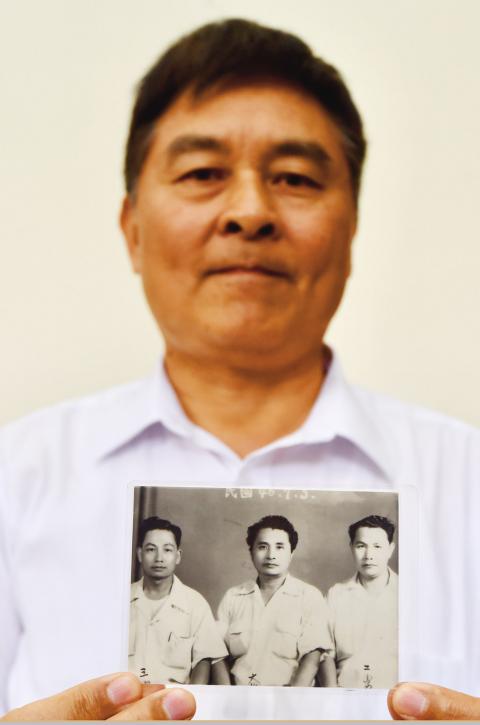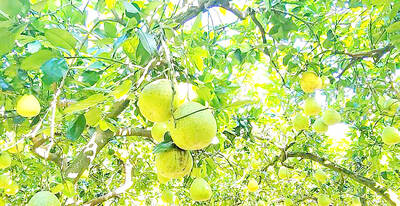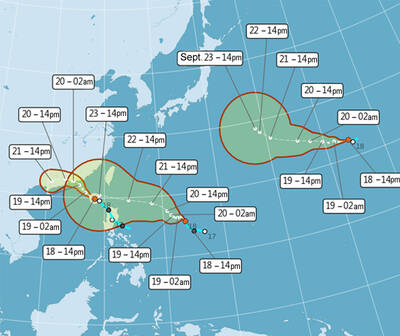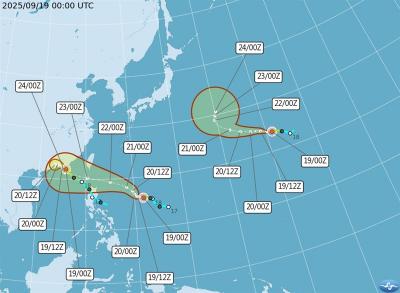Victims of the 1952 Luku Incident (鹿窟事件) and their families urged the government to construct a memorial hall in their honor at a gathering on Thursday hosted by the Control Yuan marking the 65th anniversary of the incident.
Control Yuan member Kao Feng-hsien (高鳳仙) said that she proposed administrative compensation and an amendment to the National Security Act (國家安全法) to give those who were sentenced an opportunity to appeal and to establish a Luku Incident memorial hall.
However, the Executive Yuan has yet to give a comprehensive response, Kao said, adding that many of the people involved are already more than 90 years old.

Photo: Chien Jung-fong, Taipei Times
In October, after a 20-month investigation, Kao and fellow Control Yuan member Yang Mei-ling (楊美鈴) issued the Ministry of National Defense a correction for the Luku Incident.
The government wanted to persecute and was not short of excuses, said Lee Shih-cheng (李石城), who was sentenced to 10 years in prison following the incident.
Lee, 83, said that compensation would mean nothing to him.
However, the value of history lies in education, Lee said, adding that he hopes the government would construct a memorial hall and that the past would not repeat.
“I apologize to everyone on behalf of my father,” said Chen Po-ming (陳柏銘), son of then-Luku base leader Chen Pen-chiang (陳本江), who attended the gathering on Thursday with a photograph of his father.
The leader is the culprit and should have been sentenced to death, but was given the opportunity to redeem himself, Chen Po-ming said.
Meanwhile, the leaders’ followers were found guilty and some were even sentenced to death, Chen Po-ming said, adding that he felt apologetic toward the other victims.
The government at the time wanted to make an example of the incident, Chen Po-ming said.
It also constructed the idea of a leader betraying their followers, Chen Po-ming said, adding that the people who participated in the organization were either farmers or miners.
“Who would know what communism is?” Chen Po-ming said, adding that the victims were wronged.
His grandfather and uncle were both executed, Chen Po-ming said, adding that all the men in the village who were productive were put in prison and only the elderly, women and children were left.
When he was young, his mother never spoke about the incident, Chen Po-ming said, adding that he only slowly understood it after reading former Academia Historica president Chang Yen-hsien’s (張炎憲) book.
The first time he saw his father was in a photograph when he was 30, Chen Po-ming said, adding that he knows that his father studied at Japan’s Waseda University and taught at China’s Peking University.
“All I say is that my father did what he did for his ideals and might have had his own considerations at the time,” Chen Po-ming said.
The 1952 Luku Incident is seen as the largest political event of the nation’s White Terror era.
Brothers Chen Pen-chiang and Chen Tung-ho (陳通和) established a Chinese Communist Party armed base in the Luku (鹿窟) village area of what is now New Taipei City’s Shihding District (石碇).
On Dec. 28, 1952, more than 10,000 soldiers and police officers reportedly blocked off all outbound roads in the area and arrested everyone who lived there with the aim of capturing members of the armed base.
More than 400 people in Shihding, Rueifang (瑞芳) and Sijhih (汐止) were arrested, with more than 200 reportedly tortured and 35 executed.
Among the 200, 12 were not indicted or released for turning themselves in, while 98 were given prison sentences, 19 of whom were underage.

NEW AGREEMENT: Malaysia approved imports last year after nearly two years of negotiations and inspections to meet quarantine requirements, officials said Up to 3.6 tonnes of pomeloes from Taiwan cleared Malaysian customs on Friday, in the first shipment of Taiwanese pomeloes to Malaysia. Taiwan-grown pomeloes are popular in domestic and overseas markets for their tender and juicy taste, the Ministry of Agriculture’s Animal and Plant Health Inspection Agency said. The fruit is already exported to Japan, Canada, Hong Kong, Singapore and the Philippines, it added. The agency began applying for access to the Malaysian market in 2023, compiling data on climate suitability, pests and diseases, and post-harvest handling, while also engaging in nearly two years of negotiations with Malaysian authorities and submitting supplementary

PEAK MONTHS: Data showed that on average 25 to 27 typhoons formed in the Pacific and South China seas annually, with about four forming per month in July and October One of three tropical depressions in the Pacific strengthened into a typhoon yesterday afternoon, while two others are expected to become typhoons by today, Central Weather Administration (CWA) forecaster Lee Ming-hsiang (李名翔) said yesterday. The outer circulation of Tropical Depression No. 20, now Typhoon Mitag, has brought light rain to Hualien, Taitung and areas in the south, Lee said, adding that as of 2pm yesterday, Mitag was moving west-northwest at 16kph, but is not expected to directly affect Taiwan. It was possible that Tropical Depression No. 21 would become a typhoon as soon as last night, he said. It was moving in a

Tigerair Taiwan and China Airlines (CAL) today announced that several international flights were canceled or rescheduled due to Typhoon Ragasa. The Central Weather Administration (CWA) has maintained sea and land warnings for the typhoon. Its storm circle reached the Hengchun Peninsula (恆春半島) on Taiwan's southern tip at 11am today. Tigerair Taiwan said it canceled Monday's IT551/IT552 Taoyuan-Da Nang, IT606/IT607 Taoyuan-Busan and IT602 Taoyuan-Seoul Incheon flights. Tomorrow, cancelations include IT603 Seoul Incheon-Taoyuan, as well as flights between Taoyuan and Sapporo, Osaka, Tokyo Narita, Okinawa, Fukuoka, Saga, Tokyo Haneda, Nagoya, Asahikawa and Jeju. On Wednesday, the IT321/IT322 Kaohsiung-Macau round-trip would also be canceled. CAL announced that today's

Three tropical depressions yesterday intensified into tropical storms, with one likely to affect Taiwan as a typhoon, the Central Weather Administration (CWA) said. The three storms, named Mitag, Ragasa and Neoguri, were designated as storms No. 17 to 19 for this year, the CWA said. Projected routes indicate that Ragasa is most likely to affect Taiwan, it said. As of 2am today, Ragasa was 1,370km east-southeast of Oluanpi (鵝鑾鼻) on the southernmost tip of Taiwan. It was moving west-northwest before turning northwest, slowing from 11kph to 6kph, the agency said. A sea warning for Ragasa is unlikely before Sunday afternoon, but its outer rim